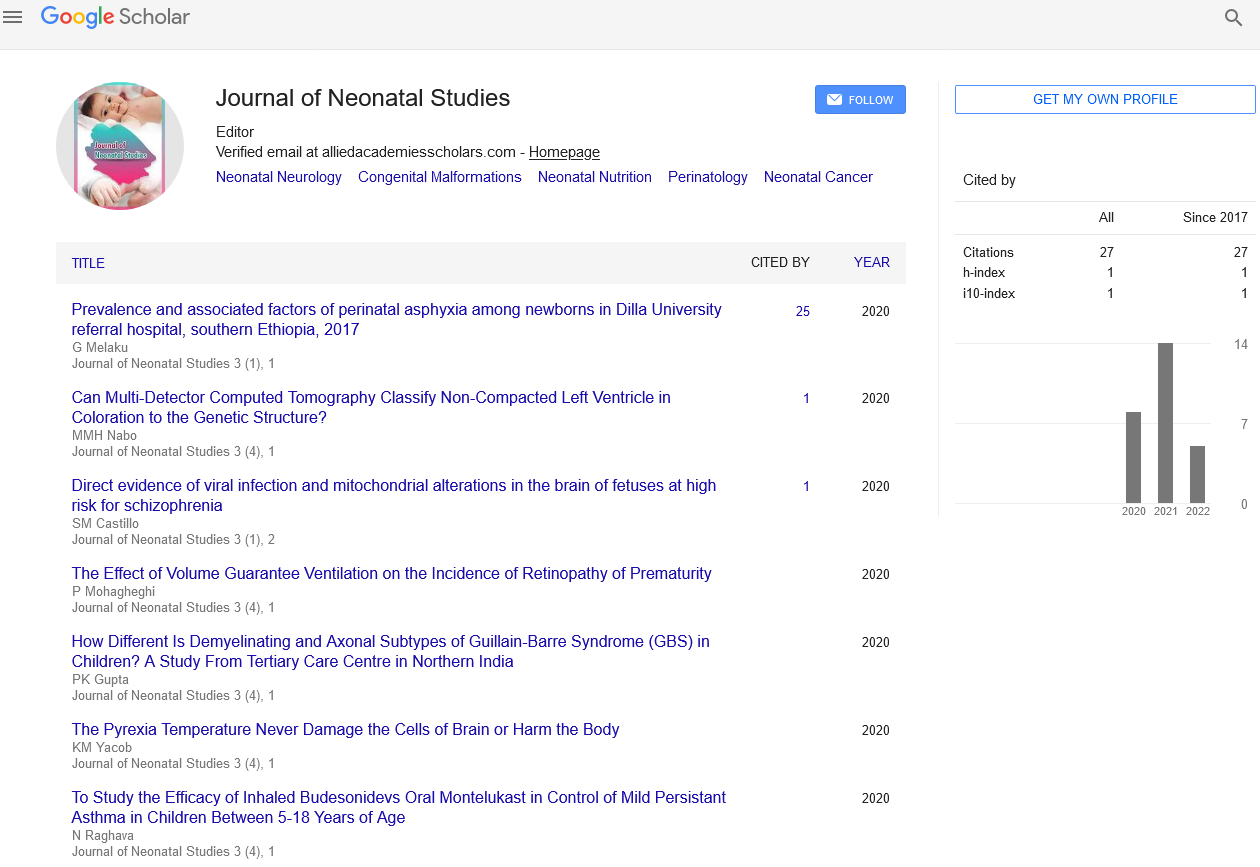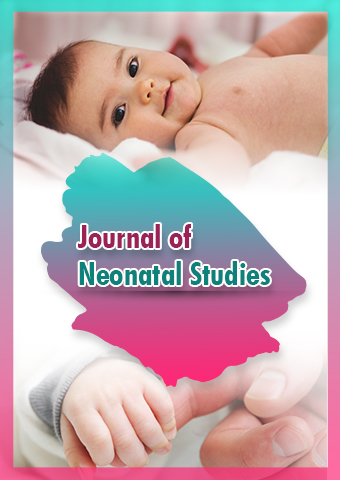Perspective - Journal of Neonatal Studies (2024) Volume 7, Issue 1
Exploring Neonatal Endocrinology: The Intricate Balance of Hormones in Early Life
- Corresponding Author:
- Honjie Kipule
Department of Neonatology, Fudan University, Shanghai, China
E-mail: hj@kipu.edu
Received: 08-Jan-2024, Manuscript No. JNS-24-124915; Editor assigned: 10-Jan-2024, PreQC No. JNS-24-124915 (PQ); Reviewed: 24-Jan-2024, QC No. JNS-24-124915; Revised: 31-Jan-2024, Manuscript No. JNS-24-124915 (R); Published: 09-Feb-2024, DOI: 10.37532/JNS.2024.7(1).180-181
Introduction
Neonatal endocrinology is a specialized branch of medicine that focuses on the study of the endocrine system in newborns. The endocrine system plays a crucial role in regulating various physiological processes through the secretion of hormones, and its proper function is essential for the normal growth and development of infants. In this article, we will delve into the intricacies of neonatal endocrinology, exploring the critical role of hormones, common endocrine disorders in newborns, and advancements in understanding and managing these conditions.
Description
The endocrine system in neonates
The endocrine system is a complex network of glands that produce and release hormones, chemical messengers that regulate numerous bodily functions. In neonates, this system is in a state of rapid development and adaptation to the extrauterine environment. Key glands involved in neonatal endocrinology include the pituitary gland, thyroid gland, adrenal glands, pancreas, and the gonads.
Pituitary gland: The pituitary gland, often referred to as the “master gland,” secretes hormones that control the function of other endocrine glands. Growth Hormone (GH), Thyroid- Stimulating Hormone (TSH), and Adrenocorticotropic Hormone (ACTH) are vital for normal growth, thyroid function, and adrenal gland activity, respectively.
Thyroid gland: The thyroid gland produces hormones such as Thyroxine (T4) and Triiodothyronine (T3), which play a crucial role in regulating metabolism, growth, and brain development. Proper thyroid function is essential for the overall well-being of newborns.
Adrenal glands: The adrenal glands secrete hormones like cortisol and aldosterone, which are involved in stress response, blood pressure regulation, and electrolyte balance. Adrenal function is particularly important during the immediate postnatal period.
Pancreas: The pancreas is responsible for producing insulin, a hormone that regulates blood sugar levels. Proper insulin secretion is critical for maintaining glucose homeostasis in neonates.
Gonads: While not fully active in neonates, the gonads (testes in males and ovaries in females) play a role in sexual development and the production of sex hormones, including testosterone and estrogen.
Hormonal adaptations in the neonatal period
The transition from intrauterine to extrauterine life involves significant hormonal adaptations to meet the changing needs of the newborn. Several key hormonal changes occur during this period:
Thyroid hormones: In the first few days after birth, there is a temporary drop in thyroid hormone levels known as transient hypothyroidism or physiological neonatal hypothyroidism. This is a normal adaptation, and thyroid hormone levels gradually increase to reach normal levels.
Cortisol: Cortisol levels rise during the stress of labor and delivery. This surge in cortisol helps the newborn adapt to the challenges of the extrauterine environment, including lung maturation and glucose regulation.
Insulin and glucose homeostasis: Insulin production increases after birth as the newborn begins to rely on glucose from feeding rather than receiving glucose through the placenta. This shift is crucial for maintaining stable blood sugar levels.
Growth hormone: Growth hormone levels surge shortly after birth, promoting growth and development. Breastfeeding further stimulates growth hormone release.
Common neonatal endocrine disorders
Despite the intricate balance of hormones in the neonatal period, certain disorders can disrupt this delicate equilibrium. Some common neonatal endocrine disorders include:
Congenital hypothyroidism: Congenital hypothyroidism occurs when the thyroid gland fails to produce adequate thyroid hormones. Early detection through newborn screening is crucial, as untreated congenital hypothyroidism can lead to intellectual and developmental delays.
Transient neonatal hypoglycemia: Neonatal hypoglycemia is characterized by low blood sugar levels shortly after birth. It can result from various factors, including maternal diabetes, prematurity, or inadequate feeding. Monitoring blood glucose levels and providing appropriate interventions are essential.
Adrenal insufficiency: Adrenal insufficiency, also known as Addison’s disease in severe cases, occurs when the adrenal glands fail to produce sufficient cortisol. Symptoms may include lethargy, poor feeding, and low blood pressure. Prompt diagnosis and treatment with cortisol replacement are critical.
Hyperthyroidism (Rare): Hyperthyroidism in neonates is rare but can occur if the mother has hyperthyroidism or if the baby has an overactive thyroid gland. Symptoms may include rapid heart rate, irritability, and poor weight gain.
Ambiguous genitalia: Ambiguous genitalia is a condition where the external genitalia do not appear typically male or female. It can result from disorders of sexual development and may require endocrine evaluation to determine the underlying cause.
Advancements in neonatal endocrinology
Advancements in neonatal endocrinology have significantly improved our understanding of hormonal regulation in newborns and enhanced diagnostic and therapeutic approaches. Some notable advancements include:
Newborn screening programs: Newborn screening programs have become more widespread, allowing for early detection of congenital endocrine disorders. These programs typically involve a blood test shortly after birth to identify infants at risk of certain conditions, enabling prompt intervention and management.
Genetic testing: Advances in genetic testing have revolutionized the diagnosis of endocrine disorders with a genetic component. Identifying specific genetic mutations allows for personalized treatment approaches and genetic counseling for families.
Endocrine imaging techniques: Non-invasive imaging techniques, such as ultrasound and Magnetic Resonance Imaging (MRI), provide detailed views of endocrine organs. These technologies aid in diagnosing structural abnormalities and guiding appropriate interventions.
Hormone replacement therapies: Hormone replacement therapies have become more refined, allowing for precise dosage adjustments and improved management of hormonal deficiencies. For example, synthetic thyroid hormone replacement is standard for congenital hypothyroidism.
Conclusion
Neonatal endocrinology plays a vital role in ensuring the proper functioning of the endocrine system during the critical early days of life. The delicate balance of hormones orchestrates essential physiological processes, and disruptions to this balance can have profound implications for the health and development of newborns. As research and technology continue to advance, the field of neonatal endocrinology holds promise for further improvements in early diagnosis, treatment modalities, and long-term outcomes.
By combining medical expertise, genetic insights, and family-centered care, healthcare professionals are working towards ensuring that every newborn receives the specialized attention needed for a healthy and thriving start in life.

